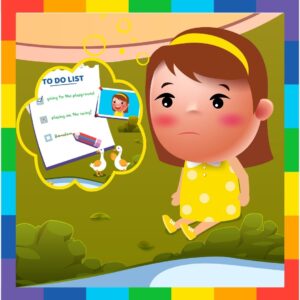
Parenting Tips
Know the Emotional Challenges Faced by Kids – Informative
September 10, 2024
Related
Topics

Hey
-

-

Green Parenting: How to Make Your Home More Eco-Friendly?
April 24, 2025
-

How Can Parents Prepare for a Second Child? Simple Guide 101
March 28, 2025
-

-

Mindful Parenting: How to Reap the Benefits?
January 14, 2025
Ready for more?
Hey
Sign up for Rainbow Kiddies newsletters for more stories and updates
As a caregiver you must have noticed that as children grow, their emotional challenges change size, shape, features and even duration. Today’s fast-paced world can make it tough for kids to stay calm and focused. Be it about difficulty in paying attention, managing big emotions, or feeling overwhelmed – the emotional challenges do not just baffle the kids, but also take the caregivers for a ride sometimes. Let us have a look at some of these emotional challenges before we jump into the mindfulness techniques in our next post.
We dedicate this month to emotional challenges and their regulation in kids. Though we have touched upon this topic a couple of times earlier, this time we have an entire month dedicated to it. As such, we will be referring to our earlier posts at several points. For better clarity on various topics or to go deeper into them, please click on the links and read further. Meanwhile we believe that one month will not be sufficient to cover every topic under this umbrella. So, we will be circling back as and when we feel like touching upon this humongous area or have related requests from our readers.
Also, while you read this post, please remember that these are just common examples, and each child is unique. They may or may not experience all the emotional challenges mentioned below, or even at the said age. Or maybe they experience something that is not even listed here. Age groups mentioned here are also only indicative. When it comes to kids, always remember that they are all different and unique in their own beautiful ways. It is important to be attentive, understanding, supportive and loving as children navigate these emotional challenges and develop important coping skills.
Emotional Challenges Faced by Kids at Various Ages
- Preschool & Early Elementary (Ages 3-7)
- Elementary School (Ages 7-10)
- Middle School (Ages 11-13)
- High School (Ages 14-18)
- Additional Considerations
So, to start off on emotions, let us look at some of the most common emotional challenges encountered by kids in various age groups:
Emotional Challenges Faced in Preschool and Early Elementary (Ages 3-7)
Big Emotions
They are called so for a reason. When they come, they do so in big ways – whether it be about the difficulty to handle or understand them, level of persistence, strength, the stress it causes to the kids and caregivers, and so on. Such kids mostly have difficulty understanding and managing feelings like anger, frustration, sadness, shame, worry, or the so-called negative emotions. Always remember that these are also universal emotions. It is perfectly ok to have them. We must help them handle these emotions the right way when they come. So, teaching our little ones about various emotions and mindfulness techniques is very important.
These big emotions may lead to tantrums or meltdowns in some cases. Sometimes these might be accompanied by more serious emotional dysregulation issues like bipolar disorder, OCD, ADHD, autism, etc. Though big emotions can happen at an age, most of the cases we get to see are probably toddlers crying on the floor in shops, throwing tantrums, hitting their caregivers, being unmanageable and so on.
When your child behaves like this it is a trigger button for you to teach them about the different feelings – big, small, good, bad. Better late than never. Also understand that they need help to learn how to manage them. Like any skill, this is also something they will learn and master with time, but your support as a caregiver is very crucial here. In case you are unable to help, get professional help or read self-help books together. There are quite a few available in the market today.
Separation Anxiety
This is when they struggle with being away from parents or caregivers, causing distress at school or daycare. Tantrums might be an add-on here. Again, understand that overcoming this is considered a major development milestone for toddlers.
Once they understand that objects exist beyond their sensory reach, this anxiety is sort of taken care of. This might happen any time the toddler has to stay away from an attachment figure to start school or daycare. It is quite unsettling for the child, and for the caregivers to see their little ones go through it. Rest assured, they will overcome this anxiety once they have more autonomy, better cognitive abilities and get a sense of object permanence. If this anxiety remains or resurfaces at a later stage in life, that could be a disorder, and it will need professional help to cure.
Transitions
A lot of children struggle with transitions. They tend to have challenges adapting to changes in routine or activities, leading to resistance or acting out (meltdowns and tantrums in some cases). Transitions can happen multiple times in a lifetime. Hence, enabling them to handle them smoothly will help them in the future too. Talking to kids, keeping them aware of upcoming or possible transitions, and understanding their feelings will help us and them in this task. This applies even for small transitions like ending screen time, playdates, bedtime, etc.
Social Skills
Learning to share, take turns, and resolve conflicts with peers can pose emotional challenges at this age. Many kids also experience challenges with making friends or feeling excluded. This is a great time to start assertiveness training, and empathy coaching. Social anxiety might be budding from within for some kids. Help them feel good about themselves. Keep talking to them, hear them out, validate their feelings, have cute little discussions – talk, talk, talk. We simply cannot stress any less on the importance of talking ‘with’ kids (not intended to be read as talking ‘to’ kids).
Focus and Attention
Some toddlers might have short attention spans and difficulty staying on task, making it challenging to complete activities or follow instructions. Remember that all attention issues do not mean ADHD (attention deficit hyperactivity disorder). Attention issues are quite common at this age. Focus might take practise and time for most kids. The rate at which kids pick up various tasks or subjects will vary. Persistent attention and focus issues might be more visible to teachers. If not normal, it could be due to learning disabilities, separation anxiety, social anxiety, OCD, etc. In few cases it could be ADHD also. So, if the lack of attention or focus feels rather unmanageable and worrying, please seek professional help.
Emotional Challenges Faced in Elementary School (Ages 7-10)

Academic Pressure
This is the stress related to schoolwork, tests, and expectations to perform well. Encouraging children to do well is good, but there is a limit. It should never become a requirement or condition. Pressure does not come just from caregivers or teachers. It could be due to heaviness of the coursework, inability to manage time and tasks, too many exams and tests, competition from friends or peers, unhealthy comparisons, etc.
Many such children end up experiencing issues like depression, anxiety or fear of failure, social anxiety, and so on. Characteristics or signs to look out for would be unhealthy competitiveness, always focused on studies, lack of physical activity or outdoor time, sleep issues, no friends, obsessed about marks and ranks, etc.
Social Dynamics
Children at this age might face emotional challenges in the process of navigating friendships, cliques, and peer pressure. Many kids at this age struggle with fitting in, bullying, or feeling left out (sometimes racism). Those who lag in social skills also tend to suffer. Again, transitions like change in school, house, etc., can further exacerbate these challenges. These issues can affect their behaviour or educational trajectory in some cases. In more serious cases, it might even affect their mental health. The skills like assertiveness, empathy, communication and cooperation come in handy now. So ensure that you introduce your little one to these skills early enough.
Self-Esteem
At this age kids develop a sense of self-worth and confidence, or the contrary if things go wrong. This is when they start getting more involved in school, in studies and learn new activities. Teachers and peers assume a lot of importance along with parents at this stage.
Failure to achieve demands, targets or expectations, and being called out for that can have a huge impact and affect their confidence. Comparison with siblings and peers can have the same effect too. Many children experience negative self-talk or tend to compare themselves to others at this age. This is where caregivers and teachers can make a huge difference. If, as a caregiver you were involved in causing this self-talk, ensure that you repair the damage caused, before it is too late.
Over-scheduling
Children might get stuffed with busy schedules at school, extracurricular activities, and homework. Ever wondered how much enrichment is too much for your child? Enrichment has benefits like learning time management and new skills, making friends, improving social skills, etc. Yet, research says that over-scheduling may lead to exhaustion, lack of free time or unstructured play, and stress for the child. Try to strike a right balance. Always remember that they are as much human as you are. They could also experience issues like depression and burnout.
Technology and Screen Time
Another challenge at this age is balancing screen time with other activities. Screen and internet exposure of the right kind can give school age children exposure to current issues, new ideas and information. Students can benefit by using collaborative platforms for doing schoolwork, projects, assignments, etc. Having said that, some kids at this age also tend to struggle with excessive use of devices or online interactions. This can in turn affect the time available for physical activity and sleep. This chain reaction could lead to issues of the eye, sleep issues, development issues (both psychological and physiological) and even affect their performance, etc.
Obesity is the first, most discussed and researched impact of screen time (especially television). Extended screen time and exposure to advertisements of high calorie foods are major causes. Another major reason is mindless snacking while watching screens. Also, media usage in bedrooms and watching screens around bedtime impacts sleep quality and thereof, performance. Children can also get exposed to several cyber risks like cyber-bullying, online sexual behaviours, video game obsession, sexting, etc.
Emotional Challenges Faced in Middle School (Ages 11-13)
Puberty and Body Image
At this age they start experiencing physical and emotional changes associated with puberty. Confusion, lack of clarity, peer pressure, need to fit in and a lot more needs could lead to experiencing body image concerns or enhanced self-consciousness. Thin body ideal driven by media, peers and sometimes even parental pressure act as environmental triggers for issues like eating disorders at this age.
Social Pressure
Increased pressure to fit in, conform to social norms, and be “cool may lead to risky behaviors (like indulging in unsafe sex, substance abuse) or even disorders (like eating disorder) at this age. They also start to feel more independent, which is a much-needed trait in grown humans (just that it can get a bit intimidating for some caregivers). Their beliefs, goals and interests might be way different from that of their parents, and this could lead to further turmoil.
Identity Development
They are busy exploring their personality, sexuality and identity. They tend to experience confusion, uncertainty, and a good friend might seem too useful at this time. The anonymity offered by internet and social media can be especially luring and they might enjoy experimenting with different identities. The feedback from social media will further guide them. This maybe for good or bad, depending on how they value and apply the feedback.
Social media’s filtered display of life, luxury and benefits could lead to unhappiness about self or family. These could lead to faulty expectations, comparisons and make the children feel confused. Judgements on social media might also seem too suggestive at this age. Make sure that they have proper guidance. Also to avoid issues like depression and suicidal thoughts, ensure that there is someone to patiently hear their feelings out.
Academic Challenges
They will now have more complex coursework and increasing expectations. They may struggle with organization, time management, or specific subjects. Increasing pressure can trigger issues like depression, and even suicidal thoughts in extreme cases. They might have a vague or clear idea about their interests and passion by now. While it is necessary to guide, make sure that you are not forcing them to do things your way. Strict parents or teachers will only further lead them to express defiance.
Mood Swings and Emotional Regulation
Hormonal fluctuations and heightened emotions kick in around this age. The brain is also busy playing games. They may experience intense mood swings or difficulty managing feelings. They tend to compare themselves to their peers who might be developing faster or slower than them. Their sleep, nutrition, stress levels and all the above-mentioned challenges will further affect mood and emotional regulation. The sexual feelings caused by changing hormones can further confuse the child. If your child is feeling continually low, irritable, disinterested and stressed nearly every day for almost 2 weeks, consider taking professional help. Read our post on depression and suicidal thoughts to understand the symptoms and signs, so you can get help before it is too late.
High prevalence of anxiety and depression has been found in autistic adolescents with ADHD. So, if you are aware that your child is neurodivergent, expect more mood swings. If you suspect the same, please get your child evaluated. (As per Harvard Health, “The word neurodiversity refers to the diversity of all people, but it is often used in the context of autism spectrum disorder (ASD), as well as other neurological or developmental conditions such as ADHD or learning disabilities. The neurodiversity movement emerged during the 1990s, aiming to increase acceptance and inclusion of all people while embracing neurological differences.”)
High School (Ages 14-18)
In addition to the challenges stated above (for middle school children), they may start experiencing extended impacts of the same, or simply continue experiencing what was explained already (sometimes more intensely). It all depends on how fast they develop or progress, how much support they have, and so on. Again, as we always say, caregivers or parents can make a big difference in the way they can confront these challenges. You can make it at least a little easier for them. So, let us now get into the challenges for this age group.
Academic Stress
The pressure explained in last stage goes several notches up now. Added to that pressure, there will be the need to excel in academics, prepare for college, and make decisions about the future. This may lead to anxiety, burnout, or sleep deprivation, which could further lead to issues like depression, suicidal thoughts, etc.
Peer Relationships
They have a lot to manage. This includes navigating complex friendships, romantic relationships, and social hierarchies. They may experience heartbreaks, drama, or social isolation. Their dynamics with parents, siblings or other members of the family can get affected. This can further worsen their challenges. Issues like bullying and racism that we had earlier talked about might get the better of them when they change college, move places, or meet new people.
Mental Health
At this age there is an increased risk of developing mental health issues like anxiety, depression, or eating disorders. They may struggle with coping mechanisms or with seeking help.
Independence and Responsibility
They start seeking more independence while balancing expectations and responsibilities. Like explained earlier they may experience conflict with parents or authority figures. They will feel the need to be understood and accepted just the way they are, more than ever before.
Social Media and Online Presence
As already explained in the last section, they may face challenges navigating social media and the pressure to present a perfect image online. In addition, they may experience cyberbullying, comparison, or negative online interactions. They may be exposed to unrealistic sexual content. All these can arouse in them faulty expectations, and more confusion.
Additional Considerations:
- Family dynamics: Challenges at home, such as divorce, conflict, or financial difficulties, can significantly impact a child’s well-being.
- Learning differences: Children with learning differences or disabilities may face additional challenges with academics, social interactions, emotional regulation, and self-esteem.
- Traumatic experiences: Experiencing trauma, such as abuse, neglect, or loss, can have lasting effects on a child’s mental and emotional health too.
Once again, remember that these were just common examples, and each child is unique. It’s important to be attentive, understanding, and supportive as children navigate these challenges and develop important coping skills. We will talk about coping skills and techniques in our upcoming posts.
Happy parenting!
Want Rainbow Kiddies' updates sent straight to your inbox? And also get a surprise welcome gift!




